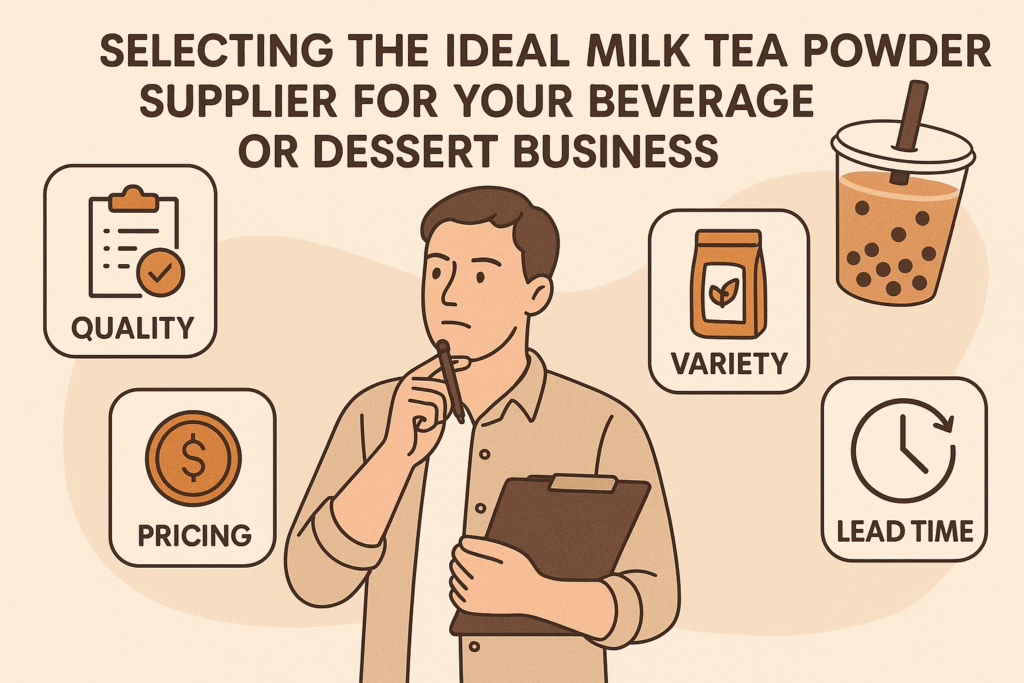The right milk tea powder supplier can elevate your beverage or dessert business, shaping customer satisfaction, brand identity, and sustained growth. High-quality ingredients are the cornerstone of memorable products, and choosing a supplier who aligns with your vision is critical. This guide highlights critical factors for choosing a supplier, emphasizing collaboration for innovative flavor development.

1. Emphasize Premium Ingredients
Exceptional milk tea starts with superior ingredients. Seek suppliers offering premium tea leaves and dairy or non-dairy components for authentic taste and texture.
- Certifications: Ensure compliance with global standards like ISO, GFSI, or organic certifications for safety and ethical sourcing.
- Freshness: Opt for suppliers with rigorous batch controls and temperature-regulated storage to maintain flavor and aroma.
- Sourcing: Prioritize tea leaves from renowned regions (e.g., Taiwan or Assam) and high-quality milk powders or non-dairy creamers for a rich, creamy finish.
2. Seek Robust Customization Options
Unique flavors differentiate your brand. Partner with suppliers who provide:
- Formula Flexibility: Customize sweetness, create non-dairy options, or develop distinctive flavors like matcha, taro, or floral infusions.
- R&D Expertise: Suppliers with dedicated research teams can co-create trend-driven flavors, such as low-sugar, superfood-infused, or culturally inspired blends (e.g., spiced chai or tropical fruit).
- Scalability: Confirm they can produce tailored formulations at scale without sacrificing consistency.
3. Demand Consistency and Dependability
In the food industry, consistency builds trust. Choose suppliers who:
- Enforce Quality Control: Conduct thorough testing for taste, texture, and solubility to ensure uniform batches.
- Maintain Reliable Logistics: Timely deliveries prevent inventory disruptions. Select suppliers with strong distribution networks and backup plans.
- Provide Transparency: Offer batch traceability and detailed quality reports for accountability.
4. Prioritize Sustainability and Compliance
Modern consumers value eco-conscious and compliant brands. Evaluate suppliers on:
- Sustainable Practices: Look for biodegradable packaging, reusable containers, or ethically sourced ingredients.
- Regulatory Adherence: Verify compliance with local food safety laws and allergen labeling to mitigate risks.
- Traceability: Ensure transparent supply chains for consumer trust and accountability.
5. Assess Reputation and Support
A supplier’s track record and support services are telling. Consider:
- Customer Feedback: Analyze reviews and case studies for insights into reliability and performance.
- Support Services: Value suppliers offering responsive communication, training (e.g., recipe guides), and troubleshooting for seamless operations.
- Industry Standing: Established suppliers with a strong reputation often indicate dependability.
6. Balance Quality with Cost
While premium ingredients are essential, cost-effectiveness matters. Explore:
- Bulk Pricing: Negotiate discounts for large orders to optimize budgets.
- Transparent Fees: Clarify shipping, handling, and minimum order costs upfront.
- Value Assessment: Weigh quality against price to ensure long-term profitability.
Crafting Custom Flavors: A Strategic Process
Developing unique flavors can captivate your audience. Follow these steps:
- Market Research: Identify local preferences, such as vegan, low-calorie, or regional flavors.
- Supplier Collaboration: Share your concept and request samples. Experiment with blends like floral teas with fruit or spiced syrups.
- Prototype Testing: Conduct focus group tastings to refine the flavor profile.
- Scale Production: Confirm the supplier can consistently deliver the finalized formula at scale.
Trends to Watch in 2025
Stay ahead by incorporating these trends:
- Health-Driven Options: Offer plant-based milk, adaptogens, or collagen-infused powders.
- Interactive Engagement: Introduce DIY flavor kits or AR-enabled packaging for immersive experiences.
- Hyper-Local Appeal: Use regional ingredients (e.g., local herbs or fruits) for authentic, unique offerings.
Conclusion
Selecting the ideal milk tea powder supplier involves balancing quality, innovation, and reliability. By prioritizing premium ingredients, customization, and sustainable practices, you can craft a standout menu that resonates with customers. For businesses venturing into custom flavors, partnering with a collaborative and adaptable supplier is vital for enduring success.
Explore trusted suppliers like Taiwan Allwin Food (milk tea powders), Monin (flavor syrups), or Sunnysyrup (boba tea syrup) for inspiration. Before committing, always ask for samples and certifications!
Source : How to Choose the Right Milk Tea Powder Supplier: 7 Key Factors to Evaluate
